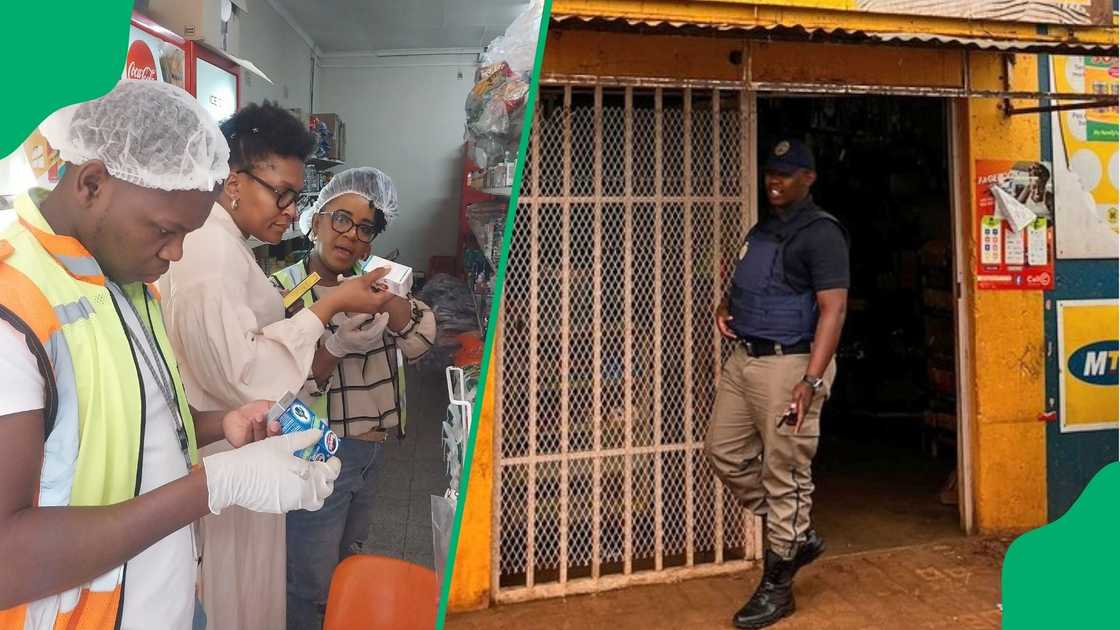Food Poisoning Declared a National Security Threat As Chemical Agent Fingered Amid 16 Gauteng Deaths
- The government highlighted the ongoing food poisoning incidents in Gauteng as a national security threat
- NatJOINTS, which coordinates security and law enforcement operations, said a chemical agent was to blame
- Health spokesperson Motalatale Modiba told Briefly News that 294 cases have been reported from February to October
- The cases in Ekurhuleni, Tshwane, Sedibeng and Johannesburg, among others, have resulted in 16 deaths

Source: Twitter
JOHANNESBURG — The government has declared the ongoing food poisoning trend in Gauteng's townships and informal settlements a national security threat.
In the past several weeks, numerous cases of foodborne illnesses and deaths have broken out, including in Ekurhuleni, Focheville, Tshwane and more recently, Soweto.
Food poisoning declared national threat
Five children aged between seven and nine died after consuming allegedly tainted snacks from a spaza shop in Naledi.
The incident sparked outrage from the community, who went on a rampage, shutting the businesses and driving shop owners away from the area.

Read also
Decomposed body of illegal miner recovered as more zama zamas resurface, police probe inquest
Gauteng health spokesperson Motalatale Modiba told Briefly News that 294 food poisoning incidents were reported between February and October.
The most cases were reported in:
- Ekurhuleni, 121;
- Tshwane, 78;
- Johannesburg, 46;
- West Rand, 46; and
- Sedibeng, 3.
Sixteen deaths have resulted, including seven in Johannesburg, four in Ekurhuleni, three in Sedibeng, and two in Tshwane.
Modiba said the age range of the deceased was six to nine years.
Since then, the National Joint Operational and Intelligence Structure (NatJOINTS), in conjunction with the South African Police Service (SAPS), the Department of Agriculture, the National Consumer Commission, and the City of Johannesburg and Ekurhuleni Metro municipalities, has launched an effort to determine the cause of the spate.
"In a meeting of the organs, each reportedly extensively discussed what they had learnt and their findings. It is commonplace that such outbreaks are caused by a biological, chemical, and/ or physical agent.
"At the end of a careful analysis, the institutions concluded that we're dealing with a chemical agent," said Health Department spokesperson Foster Mohale.
NatJOINTS said it was treating the crises as a national security threat.
"These increasing incidents in communities have led to the perception that the authorities are turning a blind eye to this crisis.
"[However], NatJOINTS, after careful analysis, recommended that the national health department coordinate all these investigations involving various institutions and bodies.
"A plan is in place to mount a systemic search for the agent causing this malady, and that action will be accelerated in the coming weeks," it said.
The plan entailed deploying health inspectors, who will join forces with officials from the other institutions and visit spaza shops and other fast-food establishments, commencing in Naledi on 21 October.
Presidency responds to deaths of 5 children
In related news, Briefly News reported that the deaths of five children sparked outrage from the community in Naledi in Soweto, south Johannesburg.
The children, aged seven to nine, allegedly ate food bought from a business operating in the area before falling ill and later dying in hospital.
Since then, the Minister in the Presidency, Khumbudzo Ntshavheni, has taken a stance on the matter, expressing the government's view.
Source: Briefly News



